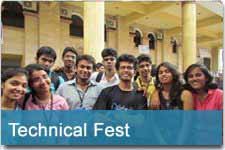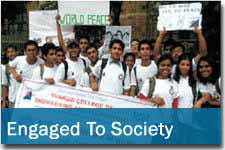

Dr. Vinitkumar Dongre
Professor & Head of Department
Department Vision
“The department of Electronics and Telecommunication Engineering envisions developing internationally competent professionals with a sense of responsibility and social sensitivity.”
Department Mission
To impart professional education endowed with human values using active learning techniques to transform the students to be competent and committed engineers meeting the current and future demands and capable of providing engineering solutions with social sensitivity.
Programme Educational Objectives
| PEO1 | To provide students with a strong foundation in the mathematical, scientific and engineering fundamentals necessary to formulate, solve and analyze engineering problems and to prepare them for graduate studies. |
| PEO2 | To prepare students to demonstrate ability to identify, formulate and solve electronics and telecommunication engineering problems. |
| PEO3 | To prepare students to demonstrate ability to design electrical and electronics systems and conduct experiments, analyze and interpret data. |
| PEO4 | To develop the ability amongst students to synthesize data and technical concepts from applications to product design. |
| PEO5 | To prepare students for successful career in the industry, by identifying the gaps between the curriculum and industry requirement. |
| PEO6 | To provide opportunity for students to work as part of teams on multidisciplinary projects, including presentation skills, technical writing and communication skills. |
| PEO7 | To motivate and prepare the students for higher studies and specialization. |
| PEO8 | To promote awareness amongst students for life-long learning and to inculcate in them professional and ethical attitude, good leadership qualities and commitment to social responsibilities. |
Programme Outcomes
| PO1 | Ability to apply knowledge of mathematics (differential equations, vector calculus, complex variables, matrix theory, probability theory), science (physics, chemistry, EVS etc.), and engineering (electrical, electronics, mechanical etc.) |
| PO2 | Ability to design and perform experiments as well as analyze and interpret data. |
| PO3 | Ability to design, simulate and test a system to meet desired specification. |
| PO4 | Ability to apply the knowledge of electrical and electronic circuits, computer programming, analog and digital electronics, principles of communication engineering, data communications, and telecommunications systems in the solution of engineering problems. |
| PO5 | Ability to function on multidisciplinary teams for projects. |
| PO6 | Ability to communicate effectively in both verbal and written form. |
| PO7 | Ability to understand the impact of engineering solutions in a global/societal context. |
| PO8 | Ability to recognize of the need for and ability to engage in lifelong learning and understanding of professional and ethical responsibility. |
| PO9 | Ability to use the techniques, skills, and modern engineering tools necessary for engineering practice. |
| PO10 | Ability to participate and succeed in competitive examinations like GATE, GRE etc. and also professional practice examinations at various levels. |
Major Subjects
Basic Engineering: Analog Electronics, Digital Electronics, Circuits and Transmission Lines, Microprocessors and Peripherals, Wave Theory and Propagation, Signals and Systems etc.
Core Engineering: Random Signal Analysis, Microcontrollers and Applications, Analog communication, Integrated Circuits, Digital Communication, Discrete Time Signal Processing, Computer Communication and Telecom Networks, VLSI Design etc.
Advanced Engineering: Image and Video Processing, Mobile Communication, Optical Communication and Networks, Wireless Networks, Internet and Voice Communication, Satellite Communication and Networks etc.
Application based:Data Compression and Encryption, Statistical Signal Processing, Speech Processing, Neural Network and Fuzzy Logic, Telecom Network Management, Ultra Wideband Communication etc.
Highlights
| Year of Starting of Program | : 2001-2002 |
| Year of establishment of Dept. | : 2002-2003 |
| Program offered | : 4 years B.E. (EXTC) , 2 years M.E.(EXTC),Ph.D |
| Faculty strength | : 31 |
| Departmental Library | : 630 Books + 475 Project Reports |
| No. of batches graduated | : 13 |
| Success rate | : 72.53 % |
| Professional chapter | : IEEE-TCET |
| Student membership | : CSI, IEEE, NSS, ISTE, IETE |
| Number of Labs | : 15 |
| Number of Class rooms | : 06 |
| Common Facilities | Seminar Hall-(03) |
| Publication | Department's E-Magazine |
Result Highlights
Toppers list
| Name of the student | Percentage | Year |
|---|---|---|
| Mr. Narayan Sahu | 8.96/10 | May-2016 |
| Mr. Amit Keshri (6th Rank in University) | 79.93 | May-2015 |
| Mr. Abhilashkumar Jha | 76.97 | May-2014 |
| Mr. Siddharth Satish Saxena | 77.29 | May-2013 |
| Ms. Sushmita Bandopadhyay | 79.23 | May-2012 |
| Mr.Mukesh M. Singh | 77.48 | May-2011 |
| Mr. Ashish R. Singh (6th Rank in University) |
79.79 | May-2010 |
| Mr. Sagar Basutkar | 75.52 | May 2009 |
| Mr. Nagesh S. Nayak (1st Rank in University) |
81.31 | May-2008 |
| Mr. Alex M. Chalunkal | 77.45 | May-2007 |
| Mr. Sunil Kumar R. | 77.93 | May-2006 |
| Ms. Sapna T. Jain | 76.55 | May-2005 |
Best Practices (Student-Centric)
- Academic deliveries as per the curriculum of UOM
- Teacher-Guardian scheme
- Local Industrial Visit for students
- Technical Seminar
- Motivation to participate in academic events
- Expert lectures by eminent guest faculty member
- Mini project implementation at S.E and T.E level
- Quality BE projects as per industry standard
- Student Development Programme (SDP)
- Training / workshop / seminars / conference
- Quality improvement programmes and R&D activities
Faculty Highlights
Publication
| Publications | Number of Faculty members | Number of Publications |
|---|---|---|
| ICWET + Multicon-W Publication | 23 | 88 |
| International/National Journals | 18 | 76 |
| National Conferences | 11 | 14 |
| International Conferences | 16 | 35 |
| Book Publication | 02 | 32 |
| Modules Publication | 27 | 65 |


